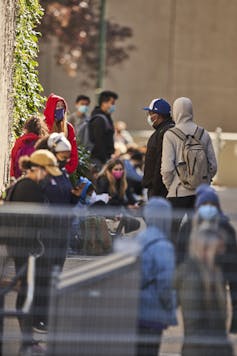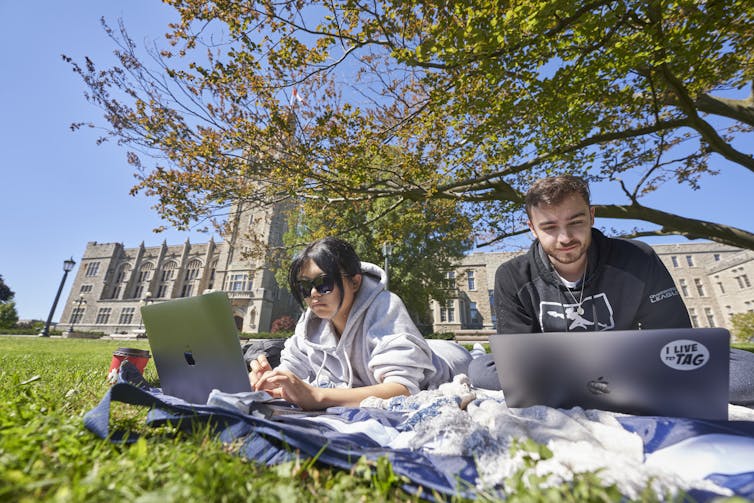
(Shutterstock)
Robert Danisch, University of Waterloo
The modern research university was designed to produce new knowledge and to pass that knowledge on to students. North American universities over the last 100 years have been exceptionally good at that task.
But this is not all that universities can do or should do. The COVID-19 pandemic has made it even easier to reduce teaching to knowledge dissemination and to obscure other, equally important, forms of education that help students be better citizens, thinkers, writers and collaborators.
These other forms of education are the cornerstone of human flourishing and democratic participation.
This is a problem.
Practical wisdom
The Ancient Greeks relied on a distinction between “knowing-that” (episteme) and “knowing-how” (techne). This was the difference between an abstract body of theoretical knowledge about an area of interest and the practical wisdom necessary to carry out a specific task.
In music, for instance, we might call this the difference between knowing what pitch means, what notes are or the other aspects of music theory that help explain how to play — and knowing how to play an instrument like the piano really well.

THE CANADIAN PRESS/Geoff Robins
For American philosopher John Dewey, this amounts to the difference between an education that focuses on information and an education that focuses on habits of thinking and deliberation.
In How We Think and Democracy and Education, Dewey prioritized teaching how to solve problems over bodies of knowledge because he knew that improved thinking skills would produce better outcomes for students and for public life.
Dewey believed that acquiring knowing-how habits, like critical thinking, problem-solving and close reading, required interaction and imitation. The practices of reading, speaking and thinking were all intertwined for Dewey, and all required practice and reflection. Practising these related skills would improve our decision-making, as individuals and as communities.
The kind of imitation he had in mind — people imitating each other — is impossible in a remote setting.
Dewey also thought curiosity, along with a recognition of, and confrontation with, real problems set people in the direction of improved thinking. These were modelled by teachers through engagement and interaction with students.
How We Think also argues that teaching students habits of using language for the purposes of persuasion is a central part of education. This drew Dewey’s work quite close to classical conceptions of rhetoric, or the teaching of how to speak and write effectively (including the emphasis on imitation as central to mastering the techne of communication).
These commitments were necessarily embodied in live practice in the classroom.
Know-how compromised online
The modern research university, since the late 19th century, has tended to prioritize “knowing-that” over “knowing-how” in a wide range of different disciplines (despite Dewey’s attempt to articulate an alternative).
Urban studies and planning professor Donald Schon’s work at the Massachusetts Institute of Technology on reflective practice was an attempt to correct this over-emphasis and apply Dewey’s approach to contemporary curricula. But the emphasis on “knowing-that” persists.
Remote learning is well suited to the kinds of education that focus on abstract theoretical knowledge and not “know-how.” And this is exactly the problem with those forms of learning — and why we ought to resist being seduced by them.
Some researchers argue that the adequacy of online learning is demonstrated by the fact that a cohort of students might achieve the same grades in an online setting as in an in-person setting. This justifies the assumption that there is no significant difference in academic performance between the two settings.
But my analysis of how people learn, grounded in rhetorical studies and Dewey’s emphasis on embodied and practical forms of democratic education, and also in my own experience administering a first-year seminar program in a faculty of arts, points to the fact that it is much harder to teach (and to assess) the “knowing-how” skills that will matter more to students’ future success.
These include learning outcomes like knowing how to analyze data, collaboration with peers, self-reflection and reading and writing.
Drowning in specialized knowledge
Specialized bodies of knowledge are everywhere now, not just in lecture halls or within the ivy-covered walls of elite institutions. If you want knowledge about advanced python programming or mycology, you can find it online through a range of different media for free. This is why silicon valley gurus can question the value of a degree from an expensive university.
The threat to the university is this: boundless “knowing-that” is readily and easily available to any student because of the very same media that have made the transition to remote teaching easy. But the same is not true for the lived experience required for developing “knowing-how” habits and practices.
As we drown in ever-increasing amounts of available knowledge, our “knowing-how” forms of wisdom continue to suffer. This is true for elementary school students that need school to learn how to navigate social relationships and for university students trying to learn how to use the scientific method or perform a critical, close reading of a poem.
Careful and close readings
To teach a student how to carefully read a text, for example, is a responsibility of the university. But this feels unlikely in remote learning environments. Dewey’s focus on the importance of the interaction between student and teacher, the modelling and imitation of habits of thinking and the necessity of creative and collaborative problem solving in the classroom are all made more difficult in a remote setting.
An isolated 18-year-old, staring at a computer, can learn what a text is supposed to mean but will have a much harder time learning how to perform a careful interpretation.

Law students Hannah Cho and Justin Capocci study on laptops at Western University in London, Ont.
THE CANADIAN PRESS/Geoff Robins
It is also one of the many “knowing-how” skills that seem so broadly absent in our public culture. Close reading is akin to close listening, which is a requirement of collaboration and a precursor to self-reflection. Journalist Kate Murphy’s You’re Not Listening shows just how complex the embodied task of reading someone else can be and how important listening and reading are for success in all fields.
What we ought to ask
Instead of asking how universities might benefit from shifting courses and curricula online permanently, we ought to be asking how students might suffer from fewer opportunities to focus on “knowing-how” and ever-greater commitments to “knowing-that.”
The pandemic has shown that we need finer, more well-honed and well-practised “knowing-how” skills. Skills like: asking thoughtful questions, finding new evidence, testing hypotheses, collaborating with diverse others, critically evaluating data or evidence, performing analysis of source material and designing new methods of evaluation.
These forms of wrestling and questioning are largely lost online. They get easily replaced with rote information processing. We should worry about the outcomes associated with that shift.![]()
Robert Danisch, Professor, Department of Communication Arts, University of Waterloo
This article is republished from The Conversation under a Creative Commons license. Read the original article.




14 Comments
Pingback: soft jazz
Pingback: เดิมพันเกม Esports
Pingback: https://www.elog-ch.com/news/newsbbs/c_count.php?url=https://casino-spin.de/slots-nplay-casino/
Pingback: biilad rafidain
Pingback: bandar togel
Pingback: torqeedo electric motor|achiles boat|achillies inflatable boat|yamaha vmax 2021|avon boats|achilies boats|achillies inflatable boats|200 hp merc outboard|avon inflatable boats|avon boat|avon inflatable boat|honda boats|200hp mercury outboard|achillies inf
Pingback: สูตรสล็อต pg ใช้ได้จริง 2024
Pingback: How to not kill yourself when bitcoin crashes
Pingback: Federal Premium MeatEater Ammunition 6.5 PRC 120 Grain Trophy Copper Tipped Boat Tail Lead Free For Sale Online
Pingback: โรงเรียนกวดวิชาณภัทรศึกษา (โอ-พลัส)
Pingback: Exology
Pingback: John Lobb
Pingback: Buy Winchester Model 1886 45/70 Govt Extra Light Lever-Action Rifle Online
Pingback: 토토검증커뮤니티